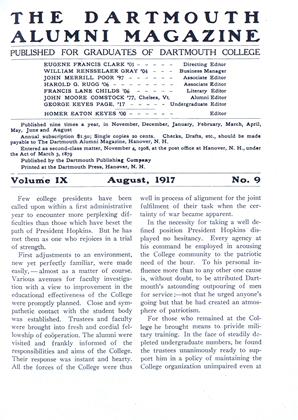Paul G. Osborn '17, attached to Section 28 of the American Ambulance Field Service, stationed near Moronvilliers, Champagne, France, died June 26, in a base hospital from injuries sustained three days earlier when bursting shell fragments wrecked his ambulance and wounded him. Osborn left this country as a member of one of the two Dartmouth College units, sailing May 5th. He was a member of the Senior class and his degree was conferred upon him after he left Hanover.
Osborn was born in Rochester, N. Y. June 24, 1894, and was a graduate of the Montclair High School. At Dartmouth he played on the varsity baseball team and was a member of D. K. E. and Sphinx fraternities. At the banquet given the Dartmouth units in New York by the Dartmouth alumni of that city Osborn was selected by the units to respond for them.
After receiving his fatal wounds, the French authorities rushed through orders for decorating Osborn, and as a result the Cross of War with the palm and the Military Medal - the latter being the highest decoration possible to be received, were conferred upon him in the hospital by General Baratier just before he passed away.
A. Piatt Andrew, director of the American Field Service, went from Paris to be present at the interment. The dead ambulance driver's brother, Albert Osborn, who is driving an army motor truck, also was present.
General Baratier presided at the impressive military ceremony. The services were held in the old shell battered chapel of Mourmelon in the presence of sixty-five American ambulance drivers from five sections stationed in the vicinity. The guard of honor was composed of soldiers from two French divisions stationed nearby, who accompanied the funeral cortege with reversed rifles. The coffin was shrouded in the American flag and mounted on a funeral carriage. As the body was interred in a military cemetery outside the town a French aviator flying above dropped a wreath presented by an escadrille stationed nearby. The American escadrille being located a long way off was unable to send an aviator.
At the military service General Baratier spoke as follows:
"In the name of the One Hundred and Thirty-fourth Division I salute Soldier Osborn, who came at the outbreak of the war to aid us to triumph for right, liberty, and justice.
"In his person I salute the army of the United States, which is fighting with us. The same ideal inspires and leads us onward. We are fighting to save the liberty of the world. Soldier Osborn, my thoughts go out to your parents, who on the other side of the ocean will learn of the grief that has stricken them.
"I know that words have no power to lessen a mother's sorrow, but I know, too, that the ideal which she inspired in the heart of her son will be able if not to dry her tears at least to transform them, for it is through these tears, the tears of all the mothers, of all women, that victory will come, that victory which will assure the peace of the world, which will be theirs more than any others, since they will have paid for it with their hearts.
"Soldier Osborn sleep on in the midst of your French comrades fallen gloriously like you. Sleep on wrapped in the folds of the United States flag in the shade of the banners of France."
General Baratier then placed the War Cross on the coffin, which was gently lowered to the grave.
 View Full Issue
View Full Issue
More From This Issue
-
 Article
ArticleVOLUNTEERS IN A CONSCRIPT ARMY
August 1917 -
 Article
ArticleGIFTS TO THE COLLEGE DURING THE PAST YEAR
August 1917 -
 Article
ArticleJUNE MEETINGS OF THE TRUSTEES
August 1917 By Henry Hoyt Hilton." -
 Article
ArticleWEDNESDAY
August 1917 -
 Article
ArticleFew college presidents have been called upon within a first administrative
August 1917 -
 Article
ArticleMONDAY
August 1917








